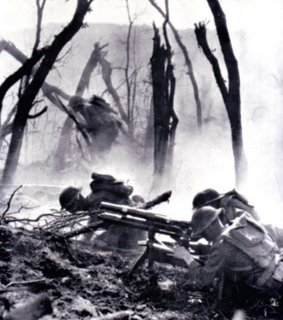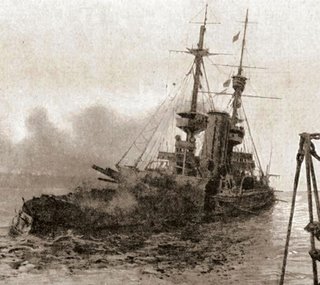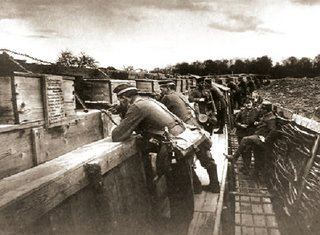IIPM BUSINESS & ECONOMY
It could have been indeed quiet on the western front...
As I uttered these words to spot the moment that spawned world history, I landed at Mortiz Schiller’s Café in Sarajevo, capital city of Bosnia & Herzegovina. The calendar swinging on one of the side walls of the café showed the date as June 28, 1914. Sitting alone, next to the sidewall was a lean and a sickly looking 19-year old Bosnian Serb mumbling, “The Archduke, Franz Ferdinand is here, and it’s our only chance to kill him, but he must be dead by now… and if not, how I wish, it is I who kill him!!” Absorbed in his own world of raging thoughts, the lad the world would come to know as Gavrilo Princip was longing to realise his murderous dreams, doing which he believed would free his nation of the ignominy of provincial statehood, given by the domineering Austro- Hungarian Empire five years back, after it annexed Bosnia & Herzegovina in 1908. His eyes burnt with a mix of fiery pride and hurt dignity and he seemed to be telling the world, both he and his country might seem weak in body and frail of spirit, but are soon going to be both great and glorious.
I landed at Mortiz Schiller’s Café in Sarajevo, capital city of Bosnia & Herzegovina. The calendar swinging on one of the side walls of the café showed the date as June 28, 1914. Sitting alone, next to the sidewall was a lean and a sickly looking 19-year old Bosnian Serb mumbling, “The Archduke, Franz Ferdinand is here, and it’s our only chance to kill him, but he must be dead by now… and if not, how I wish, it is I who kill him!!” Absorbed in his own world of raging thoughts, the lad the world would come to know as Gavrilo Princip was longing to realise his murderous dreams, doing which he believed would free his nation of the ignominy of provincial statehood, given by the domineering Austro- Hungarian Empire five years back, after it annexed Bosnia & Herzegovina in 1908. His eyes burnt with a mix of fiery pride and hurt dignity and he seemed to be telling the world, both he and his country might seem weak in body and frail of spirit, but are soon going to be both great and glorious.
 The Archduke, 51-year old Franz Ferdinand was coming to Bosnia to survey the military and to open a museum in Sarajevo when around a ten-member secret youth nationalist organisation, Black Hand, planned to assassinate him and thus positioned themselves at diff erent locations on the route of Franz’s trip, so as to turn the “Bosnia Herzegovina weds Croatia” journey into the Archduke’s death procession.
The Archduke, 51-year old Franz Ferdinand was coming to Bosnia to survey the military and to open a museum in Sarajevo when around a ten-member secret youth nationalist organisation, Black Hand, planned to assassinate him and thus positioned themselves at diff erent locations on the route of Franz’s trip, so as to turn the “Bosnia Herzegovina weds Croatia” journey into the Archduke’s death procession.
The brusque young lads ready to let go off their lives held the trigger of the gun in their hands, with Mehmed Mehmedbašić on the first location across the Cumburja Bridge, but missed a chance to shoot through the crowd. Cabrinovio stationed further down the road, dropped a bomb on the motorcade but missed Franz’s car. Assuming the mission to be a success, the third assassin-to-be moved away from his post and Gavrilo, the fourth one, went across from his location to the café on Franz Joseph Road, which is where I caught sight of him ruminating on the day’s events. Suddenly, Princip rushed out, as he saw a lonely car, with the Archduke and his wife Sophie in it, drive past. Although taken by surprise, Princip didn’t want to miss the opportunity and blinded by passion and encumbered by untrained awkwardness, he aimed at the Duke but shot the Duchess instead. The second, however, was one of the loudest shots ever fired and it still echoes in the pages of history and the valleys of the Balkans, for with that second bullet that killed the Archduke, Gavrilo in his naiveté, changed the face of history.
the third assassin-to-be moved away from his post and Gavrilo, the fourth one, went across from his location to the café on Franz Joseph Road, which is where I caught sight of him ruminating on the day’s events. Suddenly, Princip rushed out, as he saw a lonely car, with the Archduke and his wife Sophie in it, drive past. Although taken by surprise, Princip didn’t want to miss the opportunity and blinded by passion and encumbered by untrained awkwardness, he aimed at the Duke but shot the Duchess instead. The second, however, was one of the loudest shots ever fired and it still echoes in the pages of history and the valleys of the Balkans, for with that second bullet that killed the Archduke, Gavrilo in his naiveté, changed the face of history.
 This ‘Assassination in Sarajevo’, fanned the fires of the warring world and led to the great WWs of history. World War I began as its aftermath, and concluded its treaties, which led to dissatisfaction in potent corners, soon leading to another massive and much more destructive World WarII.
This ‘Assassination in Sarajevo’, fanned the fires of the warring world and led to the great WWs of history. World War I began as its aftermath, and concluded its treaties, which led to dissatisfaction in potent corners, soon leading to another massive and much more destructive World WarII.
Nationalism and patriotism are great virtues, indeed, but when young unknowing hands hold the gun, their actions are devoid of reason or consideration for consequence and the battle ceases to be for truth and justice and is oft en reduced to a personal quest for glory or a reprieve from one’s circumstances. Their actions could plunge their world, into darkness and despair for generations. This holds true as much for a 19 year old in Kashmir, in Iran, in Liberia, or in the Basque region, as it did that fateful day for Gavrilo Princip of Bosnia Herzegovina.
a personal quest for glory or a reprieve from one’s circumstances. Their actions could plunge their world, into darkness and despair for generations. This holds true as much for a 19 year old in Kashmir, in Iran, in Liberia, or in the Basque region, as it did that fateful day for Gavrilo Princip of Bosnia Herzegovina.
As I stared at the blood stains of the Franz Joseph road, with none of that which triggered a moment back, I realised that if great passion is not tempered with greater wisdom, it invariably precipitates the greatest of catastrophes.
Read More IIPM Articles, Click here
Source :- IIPM Editorial, 2006, Editor - Prof. Arindam Chaudhuri
Some Fantastic IIPM Blogs, Visit below...
It could have been indeed quiet on the western front...
As I uttered these words to spot the moment that spawned world history,
 I landed at Mortiz Schiller’s Café in Sarajevo, capital city of Bosnia & Herzegovina. The calendar swinging on one of the side walls of the café showed the date as June 28, 1914. Sitting alone, next to the sidewall was a lean and a sickly looking 19-year old Bosnian Serb mumbling, “The Archduke, Franz Ferdinand is here, and it’s our only chance to kill him, but he must be dead by now… and if not, how I wish, it is I who kill him!!” Absorbed in his own world of raging thoughts, the lad the world would come to know as Gavrilo Princip was longing to realise his murderous dreams, doing which he believed would free his nation of the ignominy of provincial statehood, given by the domineering Austro- Hungarian Empire five years back, after it annexed Bosnia & Herzegovina in 1908. His eyes burnt with a mix of fiery pride and hurt dignity and he seemed to be telling the world, both he and his country might seem weak in body and frail of spirit, but are soon going to be both great and glorious.
I landed at Mortiz Schiller’s Café in Sarajevo, capital city of Bosnia & Herzegovina. The calendar swinging on one of the side walls of the café showed the date as June 28, 1914. Sitting alone, next to the sidewall was a lean and a sickly looking 19-year old Bosnian Serb mumbling, “The Archduke, Franz Ferdinand is here, and it’s our only chance to kill him, but he must be dead by now… and if not, how I wish, it is I who kill him!!” Absorbed in his own world of raging thoughts, the lad the world would come to know as Gavrilo Princip was longing to realise his murderous dreams, doing which he believed would free his nation of the ignominy of provincial statehood, given by the domineering Austro- Hungarian Empire five years back, after it annexed Bosnia & Herzegovina in 1908. His eyes burnt with a mix of fiery pride and hurt dignity and he seemed to be telling the world, both he and his country might seem weak in body and frail of spirit, but are soon going to be both great and glorious. The Archduke, 51-year old Franz Ferdinand was coming to Bosnia to survey the military and to open a museum in Sarajevo when around a ten-member secret youth nationalist organisation, Black Hand, planned to assassinate him and thus positioned themselves at diff erent locations on the route of Franz’s trip, so as to turn the “Bosnia Herzegovina weds Croatia” journey into the Archduke’s death procession.
The Archduke, 51-year old Franz Ferdinand was coming to Bosnia to survey the military and to open a museum in Sarajevo when around a ten-member secret youth nationalist organisation, Black Hand, planned to assassinate him and thus positioned themselves at diff erent locations on the route of Franz’s trip, so as to turn the “Bosnia Herzegovina weds Croatia” journey into the Archduke’s death procession.The brusque young lads ready to let go off their lives held the trigger of the gun in their hands, with Mehmed Mehmedbašić on the first location across the Cumburja Bridge, but missed a chance to shoot through the crowd. Cabrinovio stationed further down the road, dropped a bomb on the motorcade but missed Franz’s car. Assuming the mission to be a success,
 the third assassin-to-be moved away from his post and Gavrilo, the fourth one, went across from his location to the café on Franz Joseph Road, which is where I caught sight of him ruminating on the day’s events. Suddenly, Princip rushed out, as he saw a lonely car, with the Archduke and his wife Sophie in it, drive past. Although taken by surprise, Princip didn’t want to miss the opportunity and blinded by passion and encumbered by untrained awkwardness, he aimed at the Duke but shot the Duchess instead. The second, however, was one of the loudest shots ever fired and it still echoes in the pages of history and the valleys of the Balkans, for with that second bullet that killed the Archduke, Gavrilo in his naiveté, changed the face of history.
the third assassin-to-be moved away from his post and Gavrilo, the fourth one, went across from his location to the café on Franz Joseph Road, which is where I caught sight of him ruminating on the day’s events. Suddenly, Princip rushed out, as he saw a lonely car, with the Archduke and his wife Sophie in it, drive past. Although taken by surprise, Princip didn’t want to miss the opportunity and blinded by passion and encumbered by untrained awkwardness, he aimed at the Duke but shot the Duchess instead. The second, however, was one of the loudest shots ever fired and it still echoes in the pages of history and the valleys of the Balkans, for with that second bullet that killed the Archduke, Gavrilo in his naiveté, changed the face of history. This ‘Assassination in Sarajevo’, fanned the fires of the warring world and led to the great WWs of history. World War I began as its aftermath, and concluded its treaties, which led to dissatisfaction in potent corners, soon leading to another massive and much more destructive World WarII.
This ‘Assassination in Sarajevo’, fanned the fires of the warring world and led to the great WWs of history. World War I began as its aftermath, and concluded its treaties, which led to dissatisfaction in potent corners, soon leading to another massive and much more destructive World WarII.Nationalism and patriotism are great virtues, indeed, but when young unknowing hands hold the gun, their actions are devoid of reason or consideration for consequence and the battle ceases to be for truth and justice and is oft en reduced to
 a personal quest for glory or a reprieve from one’s circumstances. Their actions could plunge their world, into darkness and despair for generations. This holds true as much for a 19 year old in Kashmir, in Iran, in Liberia, or in the Basque region, as it did that fateful day for Gavrilo Princip of Bosnia Herzegovina.
a personal quest for glory or a reprieve from one’s circumstances. Their actions could plunge their world, into darkness and despair for generations. This holds true as much for a 19 year old in Kashmir, in Iran, in Liberia, or in the Basque region, as it did that fateful day for Gavrilo Princip of Bosnia Herzegovina.As I stared at the blood stains of the Franz Joseph road, with none of that which triggered a moment back, I realised that if great passion is not tempered with greater wisdom, it invariably precipitates the greatest of catastrophes.
Read More IIPM Articles, Click here
Source :- IIPM Editorial, 2006, Editor - Prof. Arindam Chaudhuri

No comments:
Post a Comment